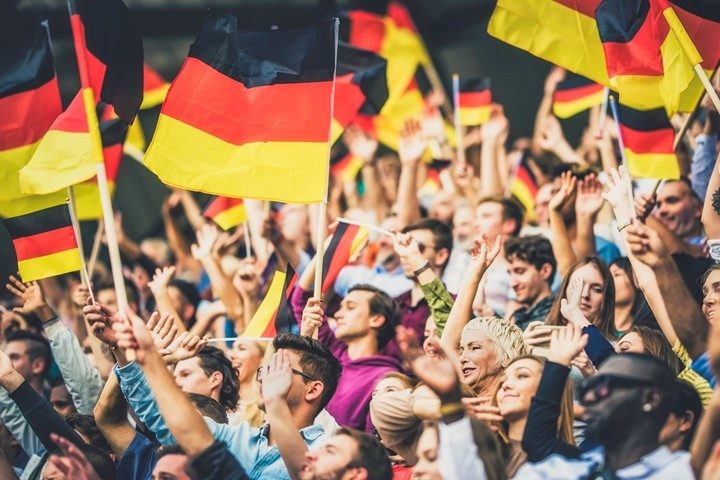
As protests opposing strict government lockdown measures ramp up across Germany, the country’s domestic intelligence service claims politically motivated crimes are on the rise and tightly intertwined with far-right groups.
The Berlin Spectator reports that the annual “Constitution Protection Report,” released Tuesday by the Federal Interior Minister Horst Seehofer and the President of the Federal Office for the Protection of the Constitution (BvF) Thomas Haldenwang, paid particular attention to “right-wing extremism,” which Haldenwang described as the “greatest threat to our security and our democracy.”
The report links a criticism of harsh government “protective measures” against COVID-19 to “far-right extremism,” and blatantly claims that groups that preach extremist views have hijacked the coronavirus debate by organizing, building, and participating in mass protests against COVID rules, such as lockdowns, mask-wearing, social distancing, and other restrictions.
Despite that the “extremists” had been a minority in those “Corona-denier protests” — as the minister calls the events — they managed to “put their stamp on the movement,” Seehofer stated.
The minister expressed his concern that the “other protesters” had not distanced themselves from the “right-wing extremists,” implying people protesting against their freedoms being violated and livelihoods taken away in fact may sympathize with anti-government radicals. The whole movement, therefore, is viewed as a compromised one.
The same perverted logic, ironically, was used for the harsh lockdowns the German people are so vigorously protesting against. The German government seems to assumes everyone who might have been in contact with someone with COVID should be considered a threat and treated as such. And since anyone might be “asymptomatic,” anyone is eligible for quarantine. If people demand their right to move about freely or that the government open up the schools and businesses, they are labeled a “Corona denier,” which seems to be a European term for “Grandma killer” in the United States.
Haldenwang further explained that these groups “spread conspiracy theories” with the goal of delegitimizing the state, and simply took advantage of the “threatening situation” of the pandemic.
It is also noted that left-wing and Islamic extremism were on the rise as well, growing by 2.8 and 2.5 percent, respectfully, and becoming “more aggressive and disinhibited.”
In April, Angela Pley, a spokesperson for BvF, channeled the same message, connecting extremists and the anti-lockdown movement. Pley said the agency was “carefully watching” members of right-wing groups “Reichsbuerger” and “Querdenker,” which have been involved in the organization of “increasingly violent protests against COVID-19 lockdowns.” The groups’ members include “conspiracy theorists” as well as many “suspected extremists,” she stated.
“Legitimate protests against the coronavirus politics are being repeatedly and increasingly exploited to provoke an escalation,” Pley said, adding that the organizers of the protests have agendas that go far beyond countering COVID-induced lockdowns. Pley failed to mention that counter-protesting German Antifa regularly showed up to clash with the anti-lockdown protesters, “provoking an escalation” as well.
The German press warns that “Querdenker,” for instance, includes “pandemic skeptics, anti-vaxxers and anti-lockdown protesters.” This broad definition may be applied to thousands of everyday Germans who simply “want their life back,” and who participated in hundreds of protests around the country the BvF itself admitted earlier this year “were largely peaceful.”
Germany first imposed COVID-19 restrictions in March 2020. These mandates were so harsh, even the country’s health minister said they were unnecessarily strict, all while having no effect on curbing the spread of the disease.
A number of tougher protocols were introduced in December 2020 in a bid to curb a second COVID-19 infection wave. These were originally slated to remain in place until at least January, but having only a moderate impact on caseloads, they were prolonged despite being evidently ineffective. Some of the measures that were already in place have been extended, while other restrictions have been tightened.
In April, German government yet again implemented new lockdown rules, issuing a set of measures expected to last until June. This sparked another wave of protests. In late May, Germany started to ease restrictions as COVID cases plummeted.
Small anti-lockdown demonstrations began in the southern city of Stuttgart last year, but the movement has grown in scope and reach, drawing people from all walks of life frustrated with restrictions in place since March.
Aside from the “public health” concerns that German authorities claim to have, a more likely rationale for officials stepping up pressure on “far-right extremists” and “conspiracy theorists” is that the citizens’ frustrations with liberal politicians and state institutions may pose a serious threat to these officials’ chance of winning the general election expected to be held September 26.




